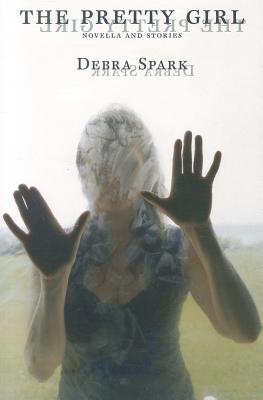Debra Spark’s “That’s Funny”
Faculty member Debra Spark’s essay, originally a Warren Wilson lecture, “That’s Funny,” appears online at Fiction Writers Review:
Three summers ago, I went straight from a ten-day teaching gig at Warren Wilson in North Carolina to Boston, where my father was dying. At least I thought he was dying. In the ten years of his long and heartbreaking decline, there were a lot of hospitalizations, a lot of moments when I thought, “This is it.” But I was wrong. He had recovered, each of those previous times. Well, sort of recovered. He hadn’t died. He was still enfeebled with a long list of health problems—epilepsy, osteoporosis, celiac disease. And then, in the last year of his life, leukemia was added to the list. So, chemotherapy. Also transfusions several times a week, all of this at the hospital where my doctor-father practiced medicine for fifty years.
My family is one that knows how to pull together in an emergency. In the days after my North Carolina job, my brother decided to fly east from San Francisco to see my dad. We didn’t want to scare my father, but if this was indeed “it,” my brother wanted to be there. My mother was already in Boston, ditto my twin sister.
And then I had a dilemma. Back home, in Maine, my ten-year-old son was in a play. This was at the Jewish day camp where he’d been all summer. And it was no small thing. He had the lead. He was going to be James in James and the Giant Peach. I could hardly leave my father’s bedside, and yet I could hardly miss my son in his play. I had already been away for my ten days in North Carolina. Never more have I wished for a zipper down the center of my body, so I could undo the raincoat of me, and send one half to Maine and leave the other half in Boston. My son’s needs won out, because my father was still conscious, and he insisted. So after a few days at my father’s side, I went back to Maine, saw the performance, spent a single night with my husband, son, and some family friends, then drove back to Boston.
When I got back to Boston, it was too late to go to the hospital, so I settled in at my parents’ condo. Then, a nurse called to say that my father wanted us to come to the hospital. This had never happened, not in all of the many times he had been hospitalized. We were always there during the day. We chatted when my father was awake, did our work while he slept. Or we listened to episodes of Wait, Wait, Don’t Tell Me, grateful for the distraction of the funny NPR quiz show. But come evening, we went home, and everyone rested. For my father to ask my mother to tax herself when she was already taxed to the limit was basically unheard of in my family. This was clearly an emergency. The nurse was calling for my father, because his tongue had swollen painfully. He couldn’t talk. When we arrived, my father was wild-eyed and frantic. Fear was not something I had ever seen on my father’s face, but now here it was. He had made a list on a piece of paper. There was the name of an ENT man, a friend of his, who he wanted my mother to call in the morning to look at his mouth. There were other instructions. He was micro-managing his care, and why not? He was a superb doctor.
“How was it?” my father mouthed, with surprising interest, given everything. He meant the play. I shrugged, smiled, admitted there was a lot of yawning during the play. The other kids were forgetting their lines. Things were taking awhile. It was my son, actually, star of the play, who was doing the yawning. My father laughed. His last laugh, I think, unless there was a chuckle while I was out of the room. It’s hard to imagine there was. He would be dead in two days.
I can’t forget that laugh. I see my father, the characteristic shake of his head and hitch of his shoulders, when he found something genuinely funny. Humor was the last good thing I could offer him. After, just grief.
In another family, there might have been better parting words: someone else might have wanted their daughter to declare how much she loved him, or how much she would miss him in the fatherless years to come. My father knew I loved him, and as for the other, why go into the depressing stuff just then? He didn’t like it during his life, so why would he welcome it during his last conscious hours of life? Better to have a laugh.
The last time I saw my paternal grandfather was also in a hospital room. Also at Boston’s Beth Israel Hospital. I asked, as I was leaving, “Are you comfortable?”
He said, “I make a living.”
The last words I ever heard him say. So the laugh is something of a family tradition. I hope I come up with something good, when it’s my time.
I laugh, because if I didn’t, I’d cry.
I hate that. I hate the melodrama, the self-importance of that.
I laugh, because if I didn’t, I’d cry.
I know it’s not all melodrama when people say that. I once went to a lecture by Jonathan Safran Foer titled “Why Jews Laugh at Things That Aren’t Funny.” In it, he allowed that he would never tell a Holocaust joke. I wouldn’t either, and I think most Jews in America aren’t inclined to tell such jokes. Safran Foer argued that the fact that we don’t joke about the Holocaust is because we are not yet prepared to say it’s a false alarm. Could that be? Do we, in America, believe we are in danger of attack? I don’t think so. Israelis, Safran Foer observed, have no problem with the Holocaust joke. They tell them all the time.
And yet how could this be? Don’t they have far more reason to feel alarmed than we in America? I told a young rabbi, who was also at the lecture, that I had wanted to ask Safran Foer about jokes about the Palestinian conflict. Did his notion about true and false alarms mean that Israelis were always serious about the very real threat in their midst? “Oh, no,” she said. “There are intifada jokes. Jokes about suicide bombing. They make them all the time.”
I laugh, because I’m scared, and I can’t go around being terrified all the time, so I laugh.
This makes more sense to me.
Anxiety laughter. I know that sort of dark laughter, of course. Who doesn’t?
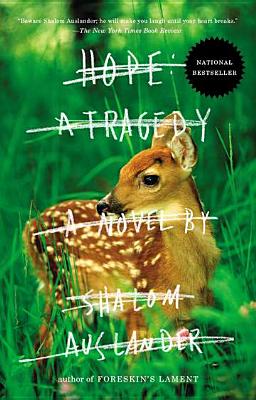 In Shalom Auslander’s novel Hope: A Tragedy (Riverhead, 2012), death-obsessed narrator Solomon Kugel has a theory that regardless of “whatever last words a person chose to utter in his final moments, everyone shared the same final thought, and this was it: the bewildered, dumfounded statement of his own disappointing cause of death.
In Shalom Auslander’s novel Hope: A Tragedy (Riverhead, 2012), death-obsessed narrator Solomon Kugel has a theory that regardless of “whatever last words a person chose to utter in his final moments, everyone shared the same final thought, and this was it: the bewildered, dumfounded statement of his own disappointing cause of death.
“Shark? You gotta be kidding me.
“Train? Really? I get hit by a train?
“Malaria? Fuck off. Malaria?”
And mean laughter. I know that type, too. But I don’t like it.
In Hope: A Tragedy, Solomon Kugel moves to the country, in part to get away from the anxieties of city life. But he only finds more to worry about in the hinterlands. One night, up late, and wondering about the scratching he hears coming from his attic, he gets up to explore. It turns out Anne Frank is living in his attic. She never died. Instead she is alive, if not well, hiding under the eaves and working on a book. Kugel doesn’t react with compassion to finding Anne, who is depicted as an ugly old hag, in his attic. His first thought is to get rid of her. He daydreams methods of driving her away, imagines calling to his wife, loud enough for Anne Frank to overhear, “Did you shower yet, honey? Because if youshowered already I’m going to shower now.”
I like this as much as I like The Three Stooges hitting each other over the head with frying pans. Which is to say, not at all.
I regularly listen to a podcast called the Slate Culture Gabfest, a weekly show in which a handful of smart thirty-somethings—at least I think they are thirty-somethings; they seem to be about a decade or so younger than me—talk about the culture news of the week. I am not, as they might say, a big “consumer” of culture, just because I am so busy with work, writing, and family. I don’t watch TV. I rarely get to the movies. My New Yorkers stack up, an unread reproach. Still I try to exercise, and when I do, I listen to the Slate Culture Gabfest. Over the years, the chat has run from the silly—what do people think of the new Dora the Explorer look?—to the more sublime. Two years ago, when I was first thinking about humor and literature, the show’s host, Stephen Metcalf, was talking, apropos of what I don’t remember, about a perfectly hilarious joke, one of the single best moments of comedy, a joke that was so good that it made comedian Jeffrey Ross’s career. Metcalf’s tastes are high-minded, his politics to the left. He is not easily won over but when he is, he is rapturous. I was eager to hear what the absolutely perfect killer line was. I can’t remember exactly how Metcalf told the story, but I found Jeffrey Ross’s online account of the joke. Apparently the line was delivered at a Friars Club Roast of Jerry Stiller. At the event, Sandra Bernhard sang an embarrassingly suggestive song to Stiller. After, Ross took his spot on stage and exclaimed, “Sandra Bernhard! Holy shit! I wouldn’t fuck you with Bea Arthur’s dick.” Apparently Arthur was also in the audience that night.
That was the hilarious line? The one that Stephen Metcalf with his rigorous standards so loved? It’s a shocking thing to say. More so in context, I am sure. But it doesn’t strike me as even slightly funny.
Mel Brooks said, “Tragedy is when I cut my finger. Comedy is when you walk into an open sewer and die.”
No question funny men Brooks and Ross know more about comedy than me, but that wasn’t the sort of laughter we were focused on in the last year of my father’s life.
Mel Brooks again: “Humor is just another defense against the universe.” And Bill Cosby: “Through humor you can soften some of the worst blows that life delivers. And once you find laughter, no matter how painful your situation might be, you can survive it.” Perhaps overly optimistic. My father had a last laugh, but he wasn’t going to survive his situation. Sometimes we just don’t.
Jonathan Safran Foer’s lecture on why Jews laugh at things that aren’t funny separated humor that depresses—humor that comes from being glad that we are not its subject—from humor that elevates, that is, a way to show gratitude or humility. It’s the latter that appeals to me in life, as in literature. Humor that entertains and, in some way, ennobles. Curious juxtapositions, cultural critique, clever observations. Poking fun at human pretension and foibles. Mere silliness. I like humor that can be done with a certain amount of love.
In the various eulogies for the critic Christopher Hitchens, who died in December of 2011, there was praise for his mind and criticism of his follies, among them alcoholism and a pretty outrageous article that he published in Vanity Fair several years earlier called “Why Women Aren’t Funny.” The point of the article was that the male of the species needs to entertain the female of the species. He needs to offer laughs. Not for humor’s sake but in order to attract. The woman of the species has no such need, having the goods, so to speak. Ergo, men = funny; women = not funny but hot. There was more to it, but Hitchens’s basic idea was that narcissism and horniness produced comedy. There’s so much subtle, unclear, ambiguous, and unintended racism and sexism in our culture, that when there’s a clear example of it, people seem almost glad. Here’s a place to direct all that pent-up rage. People had a field day with Hitchens. [See: Allesandra Stanley’s Vanity Fair essay in response to Hitchens, “Who Says Women Aren’t Funny?“] But rather than engage with Hitchens’s unfair categorical statement, I thought I’d make one of my own.
The humor that works in literary fiction, the humor I like, is female. I mean “female” in a pretty stereotypical way here. I don’t mean that the literary work is by women per se, but that it is relational. I had to look up this word, to make sure I wasn’t simply referencing psychobabble, and the definition is “of or arising from kinship” or “indicating and constituting relation.” Exactly.
When the movie Bridesmaids came out two years ago, the praise for its humor inevitably seemed to engage with this issue of women and comedy, itself a sort of defensive sexism, since when did a funny movie ever start people discussing men in this respect? Still the movie was written by women, it starred women, and presumably its appeal was also largely to women.
At the end of her New York Times review (May 12, 2011), Manohla Dargis wrote:
Contra Christopher Hitchens and his 2007 assertion in Vanity Fair that women are not funny, they offer irrefutable proof that along with producing and starring in a hit TV series (thank you, Tina Fey), women can go aggressive laugh to aggressive-and-absurd laugh with men. All they need, beyond talent and timing, a decent director and better lines, is a chance. It helps if the director has a clue, and if everyone involved sees women not just as bosoms with legs, but as bosoms with legs and brains.
Is the country so retrograde that a substantial number of people still see women as “bosoms with legs”? I have a little more faith in us. But even so, the point is clear enough. You can turn to women for yucks.
When Paul Feig, the director of Bridesmaids, was on an episode of the NPR radio show Wait, Wait, Don’t Tell Me, the host Peter Sagal asked him if he learned anything he didn’t know about women through the experience of making the movie. Feig responded:
Honestly, it just reinforced everything that I thought to be true, which is just that guys are really about kind of putting each other down and being very aggressive in their humor to each other. And women’s humor seems to be a little more supportive. It’s just kind of trying to make the other one laugh through funny voices and kind of talking about other people. I respond to that. I feel less like I’m going to get beat up in a room full of women than I do in a room full of guys.
To my mind, the greatest comic literary writers of the day are like the comedians of Bridesmaids then. They are “female,” whether they be Lorrie Moore, Rick Russo, or Tom Perrotta. They are writing about human arrogance, human desire, human peccadilloes, and human situations. This doesn’t obviate the desire to be fanciful (witness George Saunders) but the operative word here is “human.” They are “relationally-focused,” which means they are deeply invested in character, and they are kind in some essential way.
If you scan the list of recent books that bill themselves as funny, you find a lot of men on the list. Is this mere happenstance? Publishing quirkola? Evidence of a deficient female funny bone? Such questions irritate me, so I decided to look at several recent books—Sara Levine’s Treasure Island!!!, Josh Ferris’s Then We Came to an End, Seth Greenland’s The Angry Buddhist, Maggie Shipstead’sSeating Arrangements, Etgar Keret’s Suddenly a Knock on the Door, and Shalom Auslander’s Hope: A Tragedy—to see if they were sufficiently “female” to work as I believe good comedy, and good fiction, ought. “It’s hard to sit alone, be quiet, and laugh out loud,” my brother says. He used to be a stand-up comedian, so I trust his wisdom in these matters. “It’s quite an accomplishment for a writer today, the true mark of great comedy, to make someone who is completely alone laugh.” For whatever it is worth, all of these books—even the Auslander, which I hated—made me laugh out loud.
A joke needs a funny premise, a novel does not. Only three of these books—Hope, Suddenly a Knock on the Door, and Treasure Island!!!— have premises that could arguably be considered funny. But it isn’t the conceit that makes these books funny; it’s the characters and the narrative voice, the personalities and the issues that arise in the books’ worlds. (This is not quite as true with Keret’s work, where the stories are driven by the cleverness of the conceits and by the number of times Keret adds a surprising twist to his initial idea.) My brother is not a big reader of literary fiction, but when I spoke to him about these things, he observed that “humor requires characters that support the existence of that humor.” In Neil Simon’s The Odd Couple, the humor depends on neatnik Felix and sloppy Oscar. “If you didn’t have these characters,” my brother said, “you couldn’t tell these jokes. If you took the humor outside the story, it wouldn’t exist. It would fall dead.”
The characters, I would argue, also need to be handled in a “female” way. They can’t be belittled or insulted, even if they are satirized. If we are telling a joke, we can be mean-spirited. But if literary fiction is the aim, then the characters cannot be mere figures of fun. They must be believable and complex. They must be humanized, even at their most ridiculous. Or dreadful. They must be treated with real compassion. Female humor requires Kantian ethics.
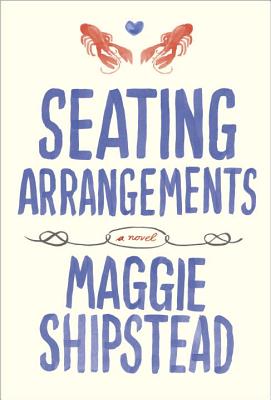 Maggie Shipstead manages this beautifully in Seating Arrangements(Knopf, 2012), which takes place over a summer weekend, during which members of a wealthy family—many of whom have an Ivy League pedigree—gather at their island summer home, to celebrate the marriage of one of two daughters. Betrayals, injuries, and messy attractions abound. Seating Arrangements is a wedding novel where the bride and groom are not the point. Everyone else is. And while there is a kind and long-suffering mother in the picture, it is the other, less noble characters who are the focus of the narrative. The book really “belongs” to the most unappealing character, Winn Van Meter, a selfish, middle-aged Harvard graduate, focused on silly markers of status and scheming to sleep with his daughter’s friend on the eve of that daughter’s wedding. And yet we understand why he is the way he is, despite the hurt he causes and his general obliviousness. During the wedding weekend, he seems more focused on why he hasn’t been admitted into the island’s exclusive social club than on the upcoming nuptials. He is foolish and yet, in his own way, winning. Indeed, we are sufficiently in his head that we almost root for him to get together with Agathe, the girl after whom he lusts, though in a broader sense, what could be more wrong?
Maggie Shipstead manages this beautifully in Seating Arrangements(Knopf, 2012), which takes place over a summer weekend, during which members of a wealthy family—many of whom have an Ivy League pedigree—gather at their island summer home, to celebrate the marriage of one of two daughters. Betrayals, injuries, and messy attractions abound. Seating Arrangements is a wedding novel where the bride and groom are not the point. Everyone else is. And while there is a kind and long-suffering mother in the picture, it is the other, less noble characters who are the focus of the narrative. The book really “belongs” to the most unappealing character, Winn Van Meter, a selfish, middle-aged Harvard graduate, focused on silly markers of status and scheming to sleep with his daughter’s friend on the eve of that daughter’s wedding. And yet we understand why he is the way he is, despite the hurt he causes and his general obliviousness. During the wedding weekend, he seems more focused on why he hasn’t been admitted into the island’s exclusive social club than on the upcoming nuptials. He is foolish and yet, in his own way, winning. Indeed, we are sufficiently in his head that we almost root for him to get together with Agathe, the girl after whom he lusts, though in a broader sense, what could be more wrong?
We also weirdly want Winn’s sister-in-law, Celeste, an alcoholic who has three former husbands and an unsettling tendency to frankness, to have that drink that she so longs for. She speaks of the first sip of an afternoon glass of gin as “bitter and fizzy … unspeakably delicious,” and in the moment, we don’t want to ship her off to AA. We just want to enjoy the glass with her. She goes on to deliver some of the novel’s funniest lines. Leaving the side of the bridesmaids and Daphne—the bride-to-be who happens to be far along in a pregnancy, her wedding dress tailored around her massive belly—Celeste says, “All right. I’ll leave you girls to it. Someone has to tell Daphne what’s going to happen on her wedding night, and I don’t have the stomach for it.” In this book, we are deeply sympathetic with characters who in their stressed and unhappy moments bungle and say the wrong thing. Winn, spinning out of control toward the novel’s close, greets some elderly weddings guests who are complaining of the temperature in a cold restaurant.
“I don’t care for the cold,” one woman says.
“Maybe,” Winn offered, “you’re feeling the chill of approaching death.”
She gave him a long gloomy squint. “This family is falling into the middle class.”
Though there are other one-liners here—a preppy man apologizes for his dress by saying, “Don’t tell anyone, but this seersucker is ironic”—a lot of the humor comes from precise observation. That is, it doesn’t always come from character sometimes, it is about character. A man introduces two people “opening his arms around them like they had just signed a peace accord.” Another man “had been a dour Young Republican in his teens and in his twenties applied himself to his finance job and to a methodical investigation of eligible women that ultimately yielded a female mirror image who fused with him in a marriage as cold and perfect as the bond between two adjacent blocks in an igloo.”
As my brother says, “If you didn’t have these characters, you couldn’t tell these jokes.”
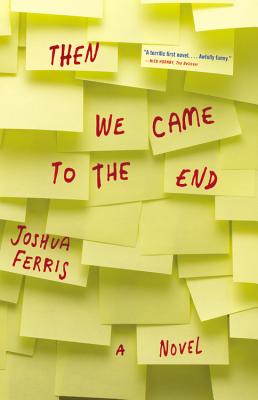 So it goes with Josh Ferris and Then We Came to the End (Little, Brown and Company, 2007), which takes place in a Chicago ad agency and is narrated by a collective voice. “We were fractious and overpaid,” the novel begins. “Our mornings lacked promise.” Though we get a brief portrait of the work culture when times are flush—“In those days it wasn’t rare for someone to push someone else down the hall really fast in a swivel chair”—the focus is on the community once things start to fall apart, and people are fired. The workers are gossipy, petty, affectionate, troubled, anxious, creative, and silly. They play ludicrous pranks on one another. They send emails they shouldn’t send. They steal the most comfortable office chairs from one another and then worry about getting caught. An older copywriter is fired, but nonetheless shows up for a meeting, because it has been on his calendar for so long. Another employee, longing for his oncologist-wife’s attention, calls her on his cell, even though she is sitting next to him in the car. The characters of Ferris’s novel are often desperate and unhappy, and yet it’s a fantastic and fantastically funny novel, and its success is directly related to the effort to humanize the characters and make them believable within the context of their world.
So it goes with Josh Ferris and Then We Came to the End (Little, Brown and Company, 2007), which takes place in a Chicago ad agency and is narrated by a collective voice. “We were fractious and overpaid,” the novel begins. “Our mornings lacked promise.” Though we get a brief portrait of the work culture when times are flush—“In those days it wasn’t rare for someone to push someone else down the hall really fast in a swivel chair”—the focus is on the community once things start to fall apart, and people are fired. The workers are gossipy, petty, affectionate, troubled, anxious, creative, and silly. They play ludicrous pranks on one another. They send emails they shouldn’t send. They steal the most comfortable office chairs from one another and then worry about getting caught. An older copywriter is fired, but nonetheless shows up for a meeting, because it has been on his calendar for so long. Another employee, longing for his oncologist-wife’s attention, calls her on his cell, even though she is sitting next to him in the car. The characters of Ferris’s novel are often desperate and unhappy, and yet it’s a fantastic and fantastically funny novel, and its success is directly related to the effort to humanize the characters and make them believable within the context of their world.
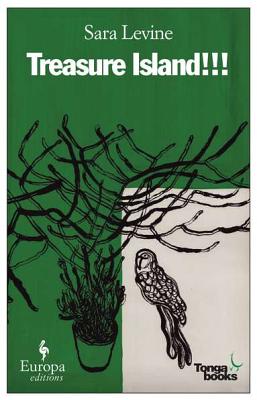 With Sara Levine’s novel Treasure Island!!!(Europa Editions, 2011), which is about a young college graduate who intends to upend her post-school malaise by living by the Core Values of Robert Louis Stevenson’s Treasure Island, we are asked to suspend our disbelief concerning the narrator’s literal embrace of the values in Stevenson’s book. She gets a parrot and sets out to acquire the qualities of the novel’s boy hero, listing those traits for herself: “BOLDNESS RESOLUTION INDEPENDENCE HORN-BLOWING.” Yet despite how far this pushes the bounds of believability, the characters are still convincing within the terms that the story sets for itself. The young narrator is home after college, barely employed at a Pet Lending Library and sponging off her boyfriend and parents. Early in her narrative, she says, “Treasure Island—as you have ample reason to know, having read it yourself or heard about it or seen the movie or maybe eaten in the restaurant Long John Silver’s—is a classic of boy’s adventure fiction.” Though the character tries to convince friends and family of the book’s virtues—“Turn the page, plunge in!”—they are rightly more aware of how the book becomes her excuse for bad behavior and laziness. Of her boyfriend, the narrator says at one point, “I suspected he had a work ethic I wasn’t interested in exploring.” The humor is all with the character’s voice, much of which connects up with the book’s ridiculous premise and the narrator’s increasingly rude behavior. Of her employer at the pet library, the narrator says:
With Sara Levine’s novel Treasure Island!!!(Europa Editions, 2011), which is about a young college graduate who intends to upend her post-school malaise by living by the Core Values of Robert Louis Stevenson’s Treasure Island, we are asked to suspend our disbelief concerning the narrator’s literal embrace of the values in Stevenson’s book. She gets a parrot and sets out to acquire the qualities of the novel’s boy hero, listing those traits for herself: “BOLDNESS RESOLUTION INDEPENDENCE HORN-BLOWING.” Yet despite how far this pushes the bounds of believability, the characters are still convincing within the terms that the story sets for itself. The young narrator is home after college, barely employed at a Pet Lending Library and sponging off her boyfriend and parents. Early in her narrative, she says, “Treasure Island—as you have ample reason to know, having read it yourself or heard about it or seen the movie or maybe eaten in the restaurant Long John Silver’s—is a classic of boy’s adventure fiction.” Though the character tries to convince friends and family of the book’s virtues—“Turn the page, plunge in!”—they are rightly more aware of how the book becomes her excuse for bad behavior and laziness. Of her boyfriend, the narrator says at one point, “I suspected he had a work ethic I wasn’t interested in exploring.” The humor is all with the character’s voice, much of which connects up with the book’s ridiculous premise and the narrator’s increasingly rude behavior. Of her employer at the pet library, the narrator says:
It was intoxicating to realize I could say no to her …. [W]hen she asked, “Did you clean litter boxes?” I said, “By god I did not clean the litter boxes.” The truth is I had cleaned them but I was still getting the hang of the “no” business and I liked the way the word felt in my mouth.
In the real world, people may not act like this, but in the world of the story, the behavior makes sense, and at the very least, the sarcasm is spot-on when it comes to the limited work (and life) opportunities for the recent college graduate. The narrator of the book is appealing in the beginning, and increasingly unlikeable as the story moves on, but in her absurdity (save perhaps at the book’s end), she is recognizably human.
Though Shalom Auslander’s book Hope has some funny lines and funny set pieces, I did not find it a funny or successful book, in part because there is no effort to humanize the characters. Solomon Kugel, the protagonist, is too one-note selfish and existentially anxious to feel real, though his existential anxiety drives many of the genuinely funny lines in the book. A book that makes Anne Frank hateful is never going to be a book I love, but Auslander doesn’t just make Anne Frank hateful. He makes everyone hateful. Granted, this is his intent. He means to play everything broadly. Kugel’s mother has spent her adult life pretending she was in a concentration camp, largely because she wants to be the biggest sufferer in any room she inhabits. Kugel can’t stand having his mother living with him—his wife is in a constant state of outrage about the matter—but Kugel generously scatters groceries over the back garden, so her mother will think she’s grown what she finds out there. Outlandish, OK. But that doesn’t bother me. Rather, it’s how much of the book describes human interactions that aren’t true to human behavior. For example, both Anne Frank and Kugel’s mother don’t (for separate reasons) want to leave their rooms at night. So when they need to go to the bathroom, they do so into the house’s heating vents. Jokes ensue about why the house stinks so much. If a joke in literature doesn’t derive from a human truth, it isn’t funny. Old women pooping in heating vents isn’t funny. The joke doesn’t comment on some “real” human tendency or dark predilection. It’s just a gross poop joke intended to make Auslander’s gross old lady characters seem even more gross.
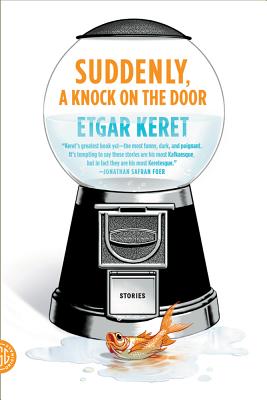 A truer scenario is the one that starts off Etgar Keret’s title story in Suddenly, a Knock on the Door (FSG Originals, 2012), where a bearded man, a pollster, and a pizza deliveryman hold the narrator (named Etgar Keret) at gunpoint and demand that he tell them a story. And not any old story. They want the sort of stories that the “real life” Keret has told in the past: funny, if pointed, stories that seem to skirt the political realities of contemporary Israel. The pizza guy begs,
A truer scenario is the one that starts off Etgar Keret’s title story in Suddenly, a Knock on the Door (FSG Originals, 2012), where a bearded man, a pollster, and a pizza deliveryman hold the narrator (named Etgar Keret) at gunpoint and demand that he tell them a story. And not any old story. They want the sort of stories that the “real life” Keret has told in the past: funny, if pointed, stories that seem to skirt the political realities of contemporary Israel. The pizza guy begs,
“C’mon, give us one and we’ll be on our way. A short one. Don’t be so anal. Things are tough, you know. Unemployment, suicide bombings, Iranians. People are hungry for something else.”
Keret plays his characters broadly here, but it is in service of a larger truth. Israelis do, in fact, long for such narratives. This is a point that the Israeli writer David Grossman has made about writing and living in a time of war. It’s not just that Keret humanizes his characters in a way that Auslander doesn’t. (And he does this throughout his book, even when he is writing from the point of a view of murderer.) He is also saying something significant about the world in which we live.
Comedy doesn’t get you off the hook, when it comes to the truth. “Fiction is art that requires the strictest attention to the real,” Flannery O’Connor wrote inMystery and Manners, and this is true whether you are writing comedy or drama, whether you are writing in the realistic or fantastic realm. Not that one has to offer literal reality in one’s work. Etgar Keret has no interest in literal reality. Yet he does what Flannery O’Connor said Kafka did when he wrote “The Metamorphosis”: he uses a certain distortion to get at the truth. In Keret’s short story “Lieland,” habitual liar Robbie finds himself in Lieland, where he has to meet the various falsehoods he’s told over the years. Specifically he encounters the damaged animals and sick people he’s used to get out of obligations. He has to meet all the injuries his imagination has brought to life. A fascinating premise, all the more because we are in the world of the essentially (if not literally) real. People lie in real life. They don’t poop in heat vents.
In a 1997 lecture he gave at Warren Wilson College, Richard Russo said that the “comic world view is as rigorously truthful as tragic one. It looks at all facets of the human condition and has the same desire to show readers through narrative how the world works.” Russo emphasizes that he is a man who loves funny details but not ones that come at the expense of truth. For him, “the real world isfunny” and his job is to show “how and why it is.”
 Seth Greenland’s The Angry Buddhist(Europa Editions, 2012), an Elmore Leonard-like satire of a West Coast political campaign, suffers from some of the same difficulties as Auslander’s novel. It’s not offensive by any means, and it is exceptionally well-written: the descriptions, in particular, are enormously well-done. But it isn’t the sort of book that you put down and say, “Yes, that’s just how it is.” It’s more the sort of book that makes you think, “Hey, that’d make a good movie.” Part of this is due to the setting: the moneyed West Coast, where bodies are always taut, minds less so. Part of this is due to the plot: you wonder throughout how things will resolve. And part of this is due to the principal characters, who are the same characters you might see in a police procedural: among others a slimy political candidate, his lonely wife, a nutty young girl who has had a brief affair with the candidate’s wife, and a police captain who is trying unsuccessfully to embrace Buddhism to deal with his own anger, hence the title of the book. I don’t know these people, and I don’t recognize them. But is this because I’ve never been to LA, because I’ve spent most of my life in New England? I don’t think so. There’s an essential selfishness and cruelty to the characters that feels untrue. Am I just being naïve about the worlds in which I don’t operate? Julian Barnes’s Sense of an Ending is about an English man trying to understand events of his past. I don’t know the people in his book. They all exist in worlds in which I don’t operate. And yet they are recognizable to me, recognizable even as they act, in moments, with great selfishness and cruelty. They seem like people rather than like characters.
Seth Greenland’s The Angry Buddhist(Europa Editions, 2012), an Elmore Leonard-like satire of a West Coast political campaign, suffers from some of the same difficulties as Auslander’s novel. It’s not offensive by any means, and it is exceptionally well-written: the descriptions, in particular, are enormously well-done. But it isn’t the sort of book that you put down and say, “Yes, that’s just how it is.” It’s more the sort of book that makes you think, “Hey, that’d make a good movie.” Part of this is due to the setting: the moneyed West Coast, where bodies are always taut, minds less so. Part of this is due to the plot: you wonder throughout how things will resolve. And part of this is due to the principal characters, who are the same characters you might see in a police procedural: among others a slimy political candidate, his lonely wife, a nutty young girl who has had a brief affair with the candidate’s wife, and a police captain who is trying unsuccessfully to embrace Buddhism to deal with his own anger, hence the title of the book. I don’t know these people, and I don’t recognize them. But is this because I’ve never been to LA, because I’ve spent most of my life in New England? I don’t think so. There’s an essential selfishness and cruelty to the characters that feels untrue. Am I just being naïve about the worlds in which I don’t operate? Julian Barnes’s Sense of an Ending is about an English man trying to understand events of his past. I don’t know the people in his book. They all exist in worlds in which I don’t operate. And yet they are recognizable to me, recognizable even as they act, in moments, with great selfishness and cruelty. They seem like people rather than like characters.
As much as I enjoyed Treasure Island!!!—and it is a wonderful hoot—I felt it broke down at the end, because it made the same mistake that Auslander and Greenland make. Though the narrator is selfish throughout the book, she’s really terrible in the end. She’s actually too terrible to be believable. Granted, she hasn’t been believable in a conventional way in many parts of the book, but her behavior, for most of the narrative, seems essentially true: honest if not actual. At the end—there is one moment where the narrator attacks her sister with a penknife—I didn’t feel like the author was aiming for human truth anymore. I didn’t feel—to borrow Russo’s phrasing—the author was showing me how and why the things of this world were funny. I felt she was making things up. At the moment, the book ceased being funny to me, and it ceased working as literary fiction.
Sometimes what makes a comic novel a great comic novel is when it isn’t funny. Part of what makes Josh Ferris’s novel of office politics so successful is that it is also a novel about breast cancer. Lynn Mason, the chilly office supervisor, has breast cancer. Or she is rumored to have breast cancer. We know this from the start of the book, and the office members speculate on her treatment, on why she hasn’t said anything about her health to others, and so on. Their curiosity picks up when Lynn calls everyone into her office and asks them to work on a pro bono ad campaign about breast cancer. She vaguely refers to a client, whose existence none of them can confirm with Web research. In the end, the ad agency employees are charged with finding a way to make breast cancer funny, even though, of course, this is an impossible assignment. There is nothing funny about breast cancer. Nothing. So, at the center of Ferris’s novel are thirty-four pages that acknowledge this. There is a chapter from the point of view of Lynn, whose consciousness has (until this chapter) been completely obscured from both the reader and the collective “we” who narrate the rest of the novel. We enter Lynn’s head, as she is in her apartment and then driving around town, on the night before her planned surgery. We go deeply with her into her life and all her life’s choices. It is the absolutely unfunny heart of the novel that makes the novel so brilliant. Later, the office workers do manage to come up with a funny ad campaign about breast cancer, and that, too, is part of the novel’s skill, that Ferris is clever enough to do something that really does seem unthinkable.
Though there is plenty of comic fiction that doesn’t make the sort of bold move that Ferris’s novel makes—that doesn’t completely leave the world of the comic at the dead center of the narrative—the best of comic fiction does have some sort of emotional ballast. The truth is that life is upsetting. It’s going to end badly for all of us, and it’s going to end badly for everyone we know. And if humor is going to be true, it is in someway going to acknowledge this. Not death per se, but life and its constrictions.
A handful of months after my father died, my mother digitized some old family videos and gave everyone in the family a DVD copy. It took me a long time to watch my DVD. When I did, I saw a scene I remembered well. In it, my younger sister, then twenty-two, my twin sister, my younger brother, and one of his close friends are all hanging around in the kitchen of what used to the family home. A cousin wanders in at some point, but mostly it is just the five of us, and we are cracking each other up, like we used to as kids. Sometimes the humor is really quite high-minded. Like when we try to stick our fingers up each other’s noses, or when my younger sister does the voice of a ditzy former roommate. But mostly it’s pure silliness. There is one long section that focuses on my sisters with stuffed animals—a large and a medium sized lobster—on their heads. The camera focuses on me, and I say, with the requisite accent, “Hello, it’s Alistair Cooke, and I hope you enjoy this week’s performance of Lobster Theatre of the Absurd.”
The camera goes back to my sisters, then my brother says, probing newsman style, “But, why, why are you wearing lobsters on your head? What are you trying to say?”
“It’s not political,” my twin sister says seriously. “It doesn’t have any meaning. It just is.”
Later, the camera focuses on a box of chocolate covered Oreos from which one cookie has gone missing. We have a hunt for the missing cookie, expressing an increasing amount of alarm at not being able to find it, until I, in what clearly strikes me as a brilliant move—as I am almost choking with laughter in the DVD—place an existing cookie on the outside of a milk carton, where you might find the photo of a lost child, and start talking about how tragic it all is.
Why have we gathered for such goofball pleasures? For we are here from our far-flung lives, David from Chicago where he works in an ad agency, Cyndy from Los Angeles where she is in business school, Laura and I from our Cambridge homes, about thirty minutes north. Well, Cyndy’s breast cancer has spread to her brain. We just found out. That’s why we are all sitting in the kitchen and laughing. No one could ever guess that this is the subtext to everything we say and do. No one. There is not one hint in the video that anyone is dealing with anything more tragic than a missing chocolate-covered Oreo.
Are we in denial? Not at all. We are panicking.
We only bought the video camera yesterday. Again, this isn’t denial, exactly. We all know what’s going on. Indeed, just moments before we started filming, my younger sister said bitterly, “You only bought that camera so you can look at me after I’m dead.”
Yes, that’s right.
I laugh, because if I didn’t, I’d cry.
We are not laughing in lieu of crying. We are laughing, because laughing is a form of pleasure you take from life, and we are miserable and we want some pleasure from life. We are entertaining each other—how nice to offer a gift at this terrible juncture—but it is more than that. My brother once said to me, “The reason why it is important for me to be funny is that life sucks.”
*
 I don’t know if real comics would use this term, but I think of some humor as “sector humor.” I, for instance, like a Jewish joke, and I would feel comfortable telling one. If you happen not to be Jewish, I might find your Jewish joke … oh, I don’t know … anti-Semitic, especially if it was sending up something that isn’t particularly appealing about Jews. I wouldn’t make a campy gay joke, since I am straight, or some sort of homeboy in the hood joke, since I am white. You, however, depending on who you are, might be comfortable with this. When you laugh at sector humor, you laugh because you belong. I have a cozy, family feeling, even when I am with strangers, when I laugh at a Jewish joke.
I don’t know if real comics would use this term, but I think of some humor as “sector humor.” I, for instance, like a Jewish joke, and I would feel comfortable telling one. If you happen not to be Jewish, I might find your Jewish joke … oh, I don’t know … anti-Semitic, especially if it was sending up something that isn’t particularly appealing about Jews. I wouldn’t make a campy gay joke, since I am straight, or some sort of homeboy in the hood joke, since I am white. You, however, depending on who you are, might be comfortable with this. When you laugh at sector humor, you laugh because you belong. I have a cozy, family feeling, even when I am with strangers, when I laugh at a Jewish joke.
In a way, though, all humor is sector humor. The sector being not a religious or ethnic group, but the “human” group. Literature is only funny if we recognize it as being about us or about what we have created. If we see it as true to who we really are.


